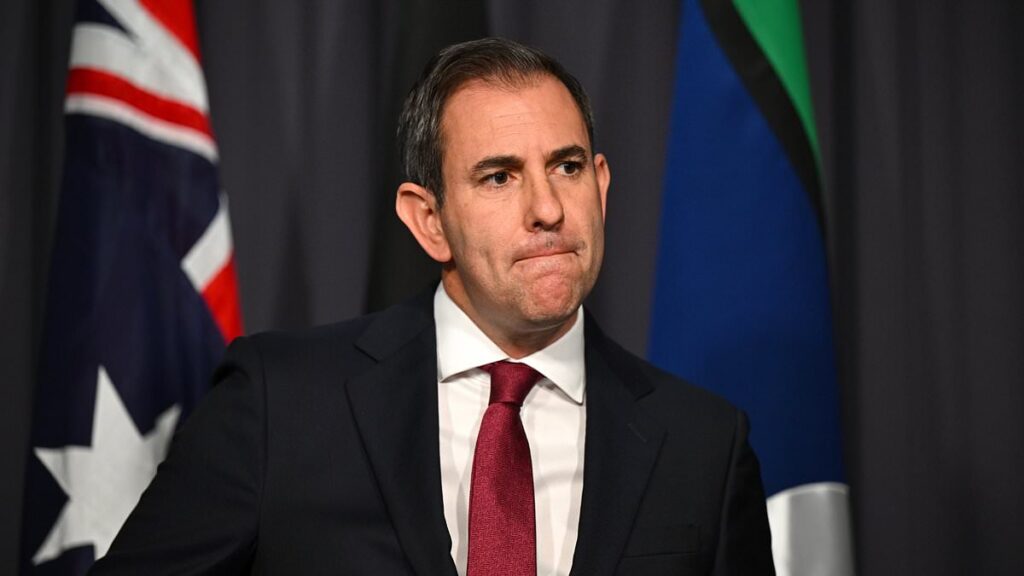Labor’s new plan to tax superannuation balances above $3million will reportedly allow people to pay the charge from their super funds, rather than having to sell assets to cover the costs.
The federal government wants to impose an extra 15 per cent tax on earnings for super balances above $3 million, bringing the total tax rate to 30 per cent for those in that bracket.
The proposal has sparked criticism for including unrealised capital gains, meaning that assets that have increased in value, such as property or shares, could also be taxed even before they’re accessed.
There were fears this could force self-managed super funds to sell assets like properties and shares to avoid being slugged.
But Sky News Australia reports that individuals in that tax bracket could pay the levy out of their super balances, rather than being forced to sell assets.
This mirrors existing arrangements for people who are already taxed more on earnings above $250,000.
Treasurer Jim Chalmers reportedly believes the fact that people can pay the tax out of their super should quieten critics who claim people will be forced to offload assets to pay for it.
The Coalition confirmed last week it would consider voting in favour of Labor’s policy to raise taxes if it scrapped the unrealised gains element and indexed the $3million threshold.
The federal government wants to impose an extra 15 per cent tax on earnings for super balances above $3 million, bringing the total tax rate to 30 per cent
The proposal has sparked criticism for including unrealised capital gains, meaning that assets that have increased in value, such as property or shares, could also be taxed even before they’re accessed
But Treasurer Jim Chalmers dropped a major hint that he will not negotiate with the Opposition as the government does not need the Opposition’s approval as it has the numbers to get any bill through the Senate with the help of the Greens.
Dr Chalmers told 7.30 host Sarah Ferguson the government would prefer to deal with the Greens than the Coalition.
‘I’m not convinced that they’re fair dinkum when it comes to making superannuation tax concessions a little bit fairer, and I think my opposite number has made that clear that they’re not interested in that,’ he said.
‘We’ll obviously have discussions with other parties in the Senate to do what we can to pass that legislation.’
This refusal to negotiate with the Opposition was made despite Prime Minister Anthony Albanese last week saying the government would negotiate with the Coalition over super policy.
‘We do not have a majority in the Senate; we obviously work with different parties,’ the Albanese said.
While Labor has a landslide majority in the House of Representatives, it needs the support of 10 other senators to get any legislation passed through the upper house.
The Greens are enthusiastic about the proposed tax, and in fact want it to kick it on balances of $2million and above, not $3million.
Treasurer Jim Chalmers reportedly believes the fact that people can pay the tax out of their super should quieten critics who claim people will be forced to offload assets to pay for it (pictured: Dr Chalmers with the Prime Minister)
Crossbencher senators David Pocock and Jacqui Lambie last year refused to support Labor’s plan to tax unrealised gains, meaning the government could only rely on the Greens in the Senate.
Shadow treasurer Ted O’Brien this week said the Coalition would be open to negotiating with the government on super provided it dropped plans to tax unrealised gains and indexed the $3million threshold.
‘When it comes to all policies, including this one, the Coalition will always be open however that doesn’t mean a blank cheque,’ he told Sky News.
‘If indeed, Jim Chalmers wants to come and have a discussion with the Coalition about his super tax, he would have to firstly walk away from the unrealised capital gains component, at least.
‘He should be compromising on indexation. Now, if he caves in on all of those things and wants to talk about super reform, let’s have a chat about super reform.’
Accountants argue taxing unrealised gains would stop self-managed super funds from investing in assets that can quickly appreciate in value, such as technology start-ups; starving that sector of funds.
Concerns have also been raised about Labor’s decision no to index the proposed $3 million tax threshold to inflation.
This means that far more people will be pushed into that tax bracket in future.
AMP calculated that refusing to index the $3million threshold for inflation would see the average 22-year-old worker today subject to the tax in four decades’ time, even if compulsory employer super contributions stayed constant.
They are rising to 12 per cent on July 1, up from 11.5 per cent.
